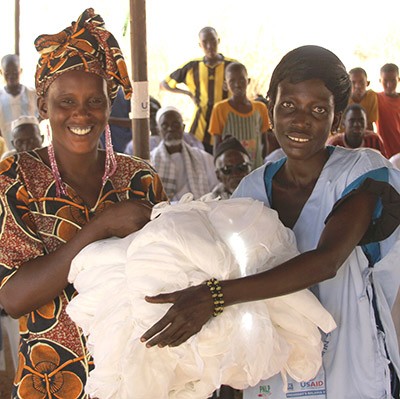Two Senegalese women receive insecticide-treated bednets through a USAID program.
USAID/Senegal’s health program is conceptualized as a "pirogue" representing elements of the health system. The body of the pirogue – USAID’s health system strengthening component - supports USAID’s community health, service delivery, and HIV/AIDS and TB activities while being powered by the ―motor‖ of the President’s Malaria Initiative. The pirogue’s ―umbrella‖ covers USAID’s health promotion and behavior change activities.
HEALTH SYSTEMS STRENGTHENING
Health Systems Strengthening is the foundation for all of USAID’s health interventions in Senegal. USAID works closely with the Government of Senegal to build and strengthen the health system at all levels—local, district, regional, and national. Key accomplishments from 2012 include the launch of a two-year performance-based financing pilot project in three districts of Senegal, and establishment of a universal health insurance pilot program based on existing Senegalese mutual health organizations.
PRESIDENT’S MALARIA INITIATIVE (PMI)
The President’s Malaria Initiative (PMI) program is a contributing force behind the substantive drops Senegal has seen in under-five mortality (-40%) and infant mortality (-21%) over the past five years. As part of its universal coverage campaign, PMI distributed more than 1.5 million long-lasting insecticide-treated nets in 2012, more than 95,000 of which were given to pregnant women and children. In addition, using Senegal’s 1,900 Health Huts as a service delivery platform, PMI trained 524 community health workers and skilled birth attendants in malaria diagnosis and treatment. These individuals managed nearly 14,000 cases of uncomplicated malaria.
COMMUNITY HEALTH
USAID/Senegal’s largest health component is the community health program, which supports all of the country’s functional, community Health Huts. In 2012, USAID expanded its training program for community health workers (CHW) to strengthen their skills in neonatal and delivery services. Trained CHWs provided essential newborn care to nearly 11,500 babies and conducted postnatal visits for 20,475 mothers. In addition, community nutritional volunteers reached 70% of the population with their nutrition activities— an integral to response to the nutritional crisis that struck Senegal in 2012.
SERVICE DELIVERY IMPROVEMENT
Closely linked to USAID/Senegal’s community health efforts is the service delivery component, which seeks to increase the quality and availability of services throughout the health system. USAID focuses on providing an integrated package of services consisting of family planning, safe motherhood, and child health, which is now available at a third of all health care points of service. The service delivery improvement program also provides continuous, on-site training to identify and respond to needs in equipment, commodities, and management using the ―Tutorat-Plus‖ approach, which provides professional training based on specifically-identified needs. In 2012, 401 health facilities participated in Tutorat.
HIV/AIDS
Although Senegal’s low prevalence of HIV among the general population (0.7%) is exceptional in sub-Saharan Africa, pockets of higher HIV prevalence and risk remain, particularly among sex-workers and men who have sex with men. In 2012, USAID provided antiretroviral therapy to 3,799 adults and children with advanced HIV and provided HIV counseling and testing services to 17,084 individuals. USAID also supported community outreach to at-risk populations through a pilot income-generating project for associations of people living with HIV/AIDS.
HEALTH PROMOTION AND BEHAVIOR CHANGE
Health promotion and behavior change is the overarching ―umbrella‖ of the Health program. In 2012 (using social media; billboard, television, and radio advertisements; talk-shows; and group information sessions) the health promotion program supported the sale of more than 1.5 million condoms, 11,000 doses of injectable contraceptives, 300,000 packages of oral contraceptives, and enough tablets to sanitize more than 6 million liters of water. This component, managed by a Senegalese organization, reflects USAID/Senegal’s commitment to building local capacity.








Comment
Make a general inquiry or suggest an improvement.